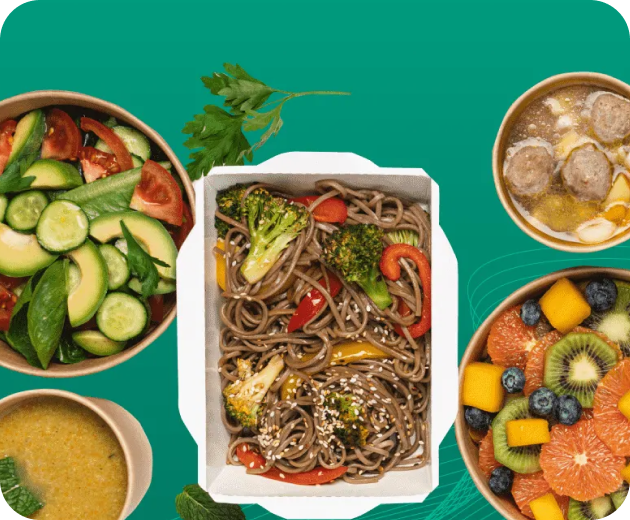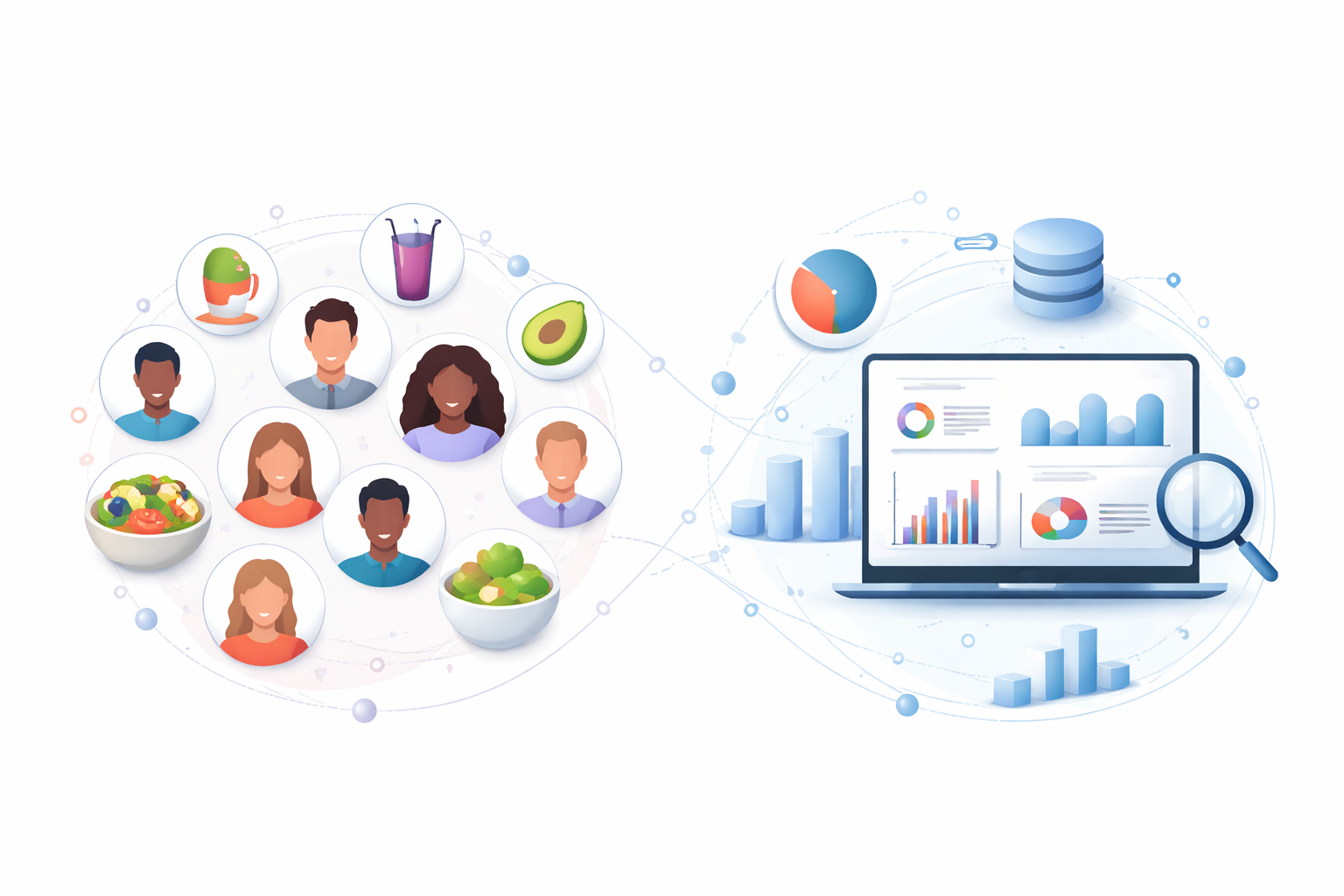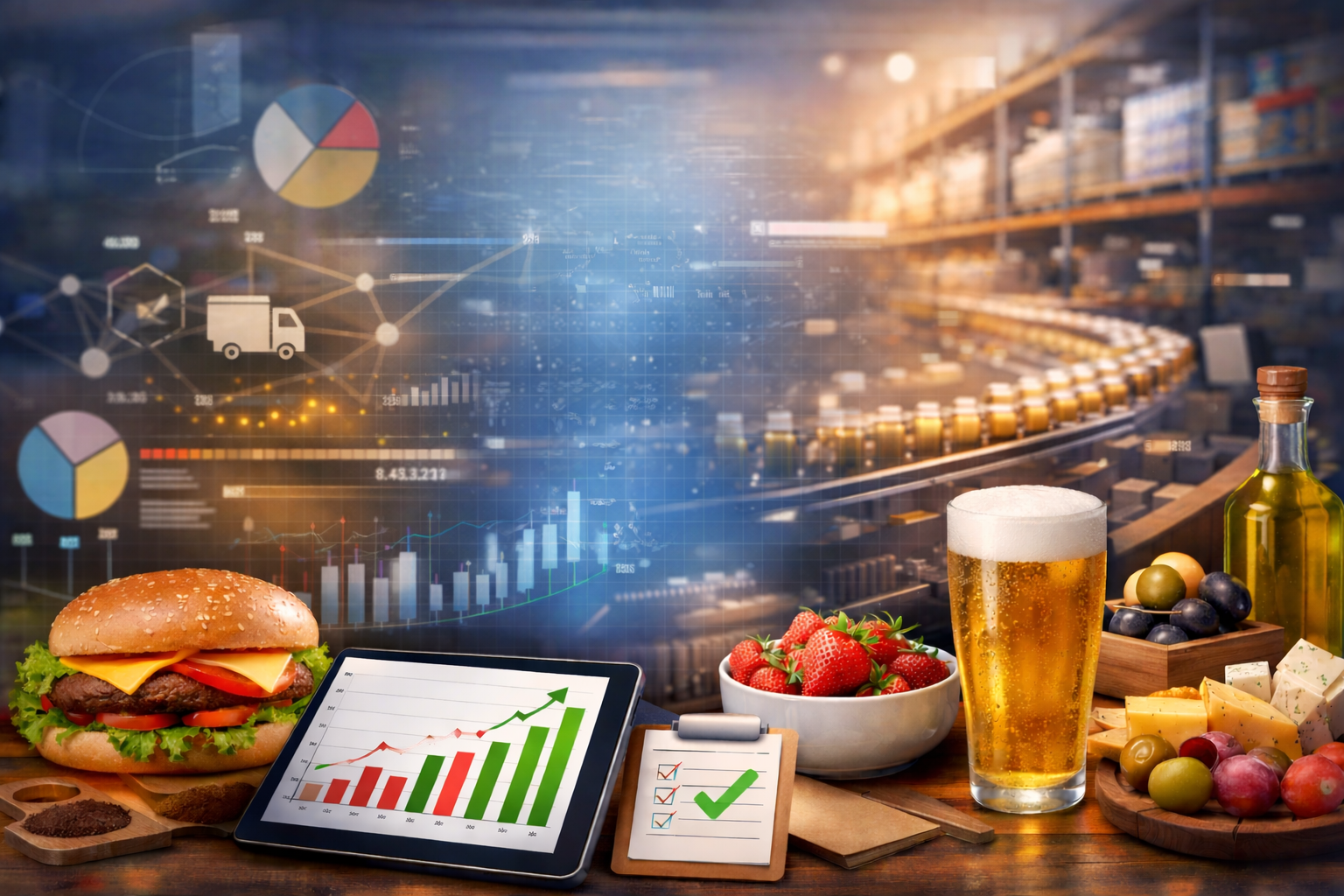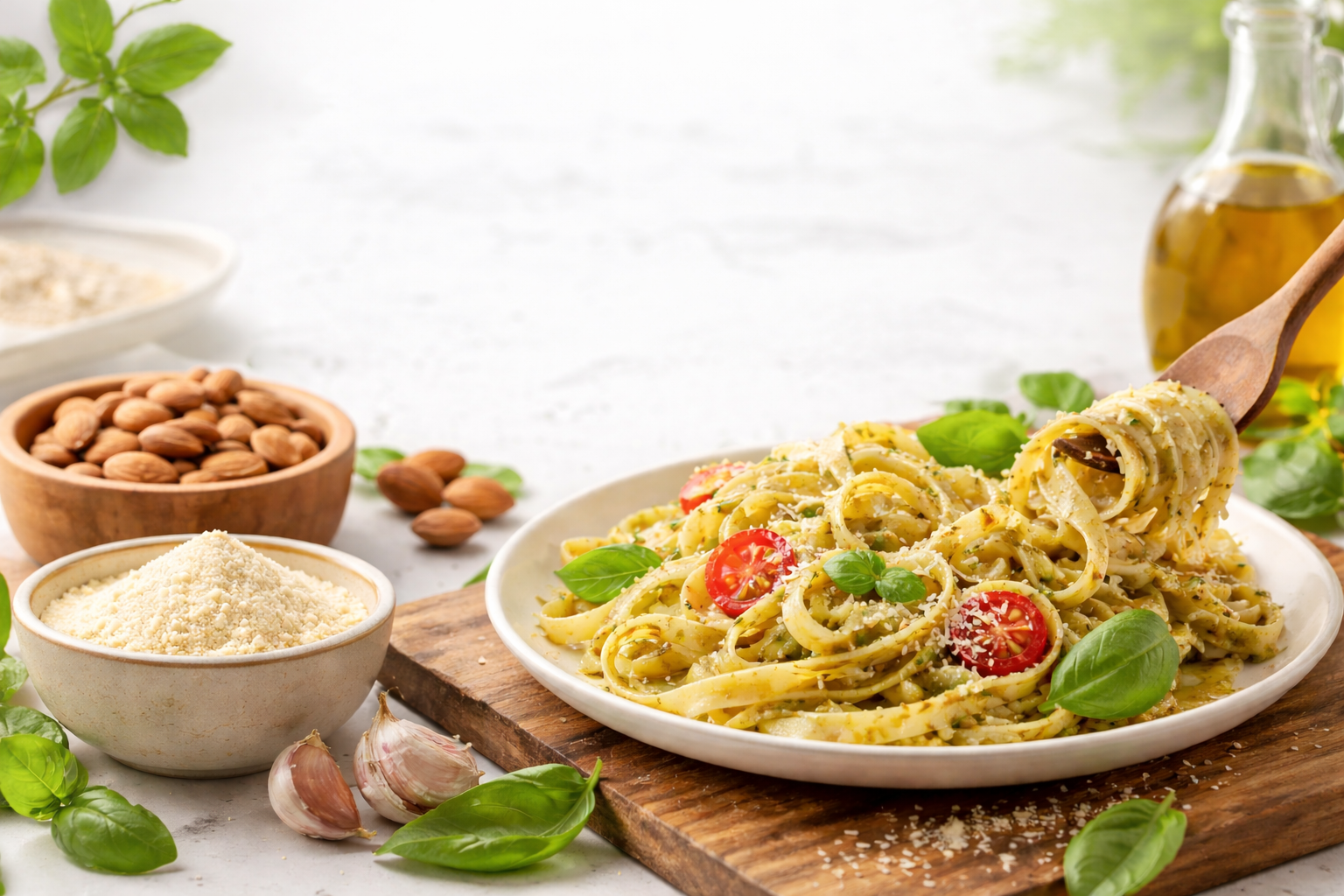AI-Infused Marketing: Adding Flavor to F&B Campaigns
Speakers: Kelli Heinz, VP Marketing & Industry Affairs, Bell Flavors & Fragrances & Jacques Botbol, CMO, Tastewise
Join Kelli Heinz, VP Marketing and Industry Relations at Bell Flavors and Fragrances, and Jacques Botbol, CMO of Tastewise, as they delve into the transformative power of AI in food and beverage marketing. Discover how AI-driven insights can craft personalized, dynamic campaigns that resonate with consumers and elevate brand engagement. Learn practical strategies to infuse your marketing efforts with innovative AI solutions.
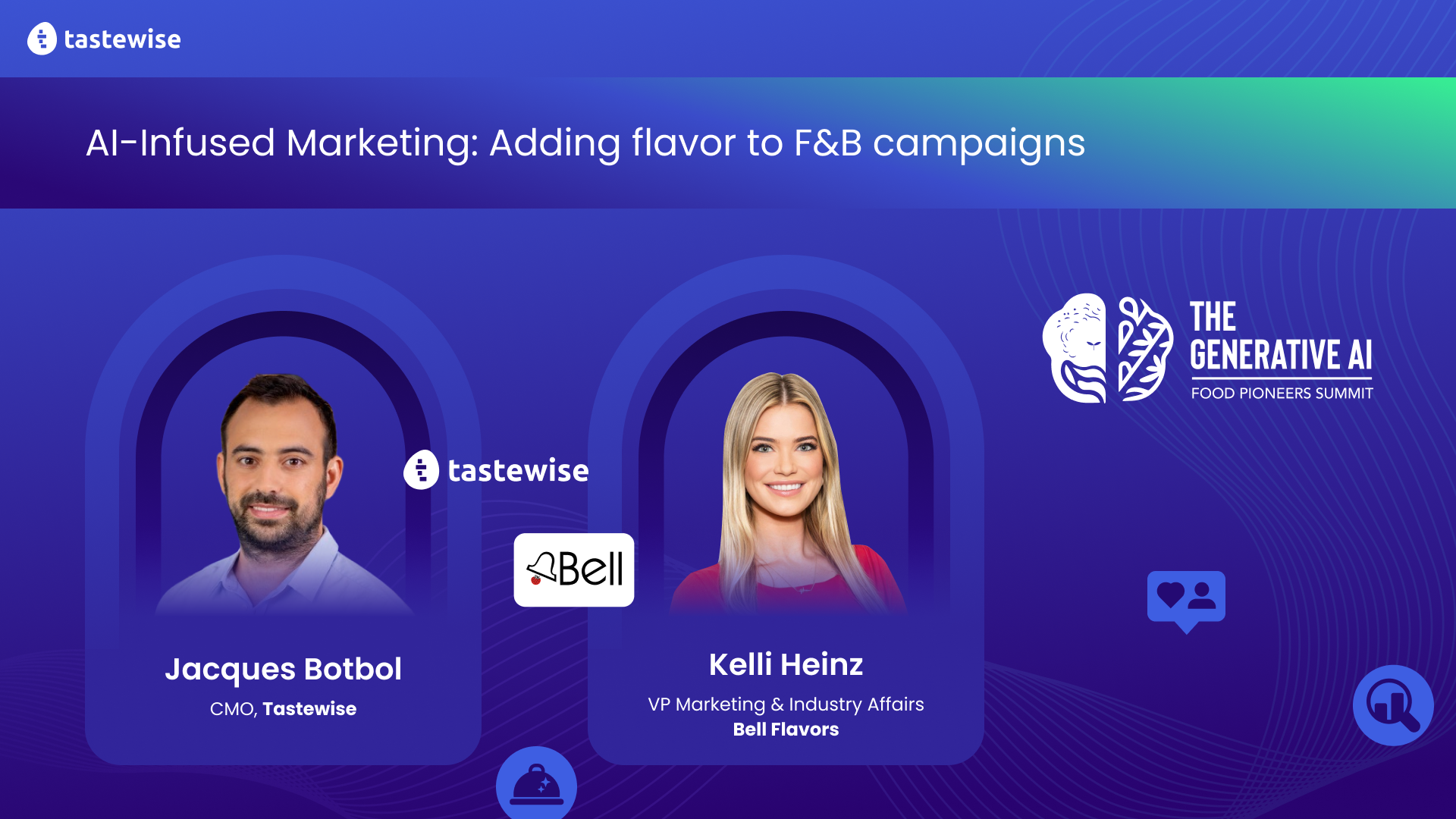
[00:01:00}
Jacques Botbol: Thank you for that introduction. I’m Jacques Botbol. I’m the CMO of Tastewise. My experience is in artificial intelligence for the last 10 years. I’ve been doing this in business intelligence, accessibility, and now in food and beverage. And I’m so excited to introduce you to Kelly Heinz. Kelly?
Kelli Heinz: Hi, my name is Kelly Heinz. I am Bell Flavors and Fragrances, VP of Marketing and Industry Affairs. I’ve been with Bell Flavors and Fragrances for 14 and-a-half years. Bell Flavors and Fragrances is a family-owned global flavor and fragrance company that services the food and beverage industry, creating flavors, fragrances, and botanicals for all different consumer product companies and food service companies.
Jacques Botbol: Yeah. And I think that we’re bringing the perfect person to discuss the craziness that is going on in the market since the last year on AI. And really, we’re going to be discussing how AI is being infused
[00:02:00]
Jacques Botbol: in our marketing departments and especially in the food and beverage world. So, Kelly, what is going on? What is all these changes that are happening? How are you seeing it? How are you guys applying them? Tell me a little bit how you are seeing this big change or this big word that is AI.
Kelli Heinz: Well, I do think AI has been the biggest topic and buzzword of 2024. Although AI has been around for quite a few years, even more than a decade, everyone seems to be utilizing it and leveraging it this year more than anything. I know we’re all trying to find new ways to use AI. From a marketing perspective, we’re using it to find innovative research, whether it’s kind of prompting ChatGPT to give us different flavor ideations, or lists, or creations. From a visual standpoint, I know we’re using AI platforms to generate images. So we can actually create an image of a product that we don’t even have to create on our own and it’ll create an actual visual so we can
[00:03:00]
Kelli Heinz: showcase unique flavors in a different application without actually making it up in our culinary center. We’re also using it to beautify presentations. It’s really kind of leveraging, getting a lot of the busy work done, too, and so leveraging our marketers to be able to kind of really focus on the research and strategy that we can create for our customers.
Jacques Botbol: Yeah. And I think that one of the key things is how accessible the tools have become thanks to AI. Now everything is much more accessible. I mean, I’m not a professional photographer but now I can create photography that probably I would have never dreamed of. And with Tastewise, for example, what we see is all that fits to the inside. How can we help you get faster to that? How are you seeing that change? Can you live with AI today after all what you have seen in the last year?
Kelli Heinz: I mean, I know from some of my team’s feedback that sometimes finding the perfect image for a product can take hours
[00:04:00]
Kelli Heinz: because you’re searching an image database. And right now you can just prompt in a few words and it will digitally create the image immediately. So it’s creating a lot of time-saving efforts. It’s also creating a lot of creativity. I know recently we were trying to think of some unique flavor ideas for a confectionary customer. And we typed in mermaid flavors. So it’s more of a fantasy flavor. And it actually generated a lot of unique creations as well as a really fun kind of rainbow-looking fish to go with it.
Jacques Botbol: And wait, how would you have done it before without all these tools?
Kelli Heinz: Usually we were using just photo databases to really kind of find, again, that image. But sometimes we’re creating such unique flavor concepts that they don’t really exist quite yet. So trying to find an image could take hours and visuals are really important for our industry, both on the flavor and fragrance side.
[00:05:00]
Jacques Botbol: What would you say, you’re seeing a lot of things happening in the AI world, you understand, and not everything is flowers. Not everything is rose. Not everything is perfect. What are you guys avoiding with AI? What are you guys are seeing that you are things that in here it’s where it fails. Now, how are you making sure that it’s actually helping you?
Kelli Heinz: Absolutely. I mean, there’s definitely hits and misses when it comes to AI. I know recently we were trying to find innovative juicy sandwich concepts and one of the ideas I came up with was a watermelon sandwich. So that’s where it did hit the mark of on the juicy comfort, but it’s really going to create kind of a very soggy sandwich counterpart. And I’m not sure it would be too tasty that way.
Jacques Botbol: Yeah, I think one of the things that we need to understand with AI is that it has a lot of hallucinations. That AI is trying to all the time make us happy. It’s like a baby,
[00:06:00}
Jacques Botbol: it’s like a kid. It’s like all the time it wants love and it wants to make sure it has an answer for everything. And we need to make sure that — the human brain is so important to make sure that we’re getting it right. That we don’t just put a watermelon sandwich, I think is a great example of that. Tell me a little bit, one of the things that we — for example, we see AI. There’s trends that before you couldn’t even dream of. For example, if you see our trends team, they got, I don’t know, they got to before it even existed. As we see all these things that are happening and AI is actually able to discover them much earlier than a human can just because it has the ability to analyze trillions of data points together. How do you think or you’re recommending your team to really put more tools, discover more of these softwares of AI in order
[00:07:00}
Jacques Botbol: to get to our consumer, to get closer to the consumers?
Kelli Heinz: Absolutely. I think the biggest thing we’ve learned is to be pretty specific with the wording and when you’re wanting it to curate any generative information. So, the more specific you are with your asks we found that you’ll actually get more tailored responses. And then also, if you’re not getting the responsego back and be a little more specific in your wording so that it’s — again, it’s like you mentioned, kind of talking to a toddler. You maybe sometimes just really talk it out with them so that it really understands what you’re trying to leverage out of the generative information.
Jacques Botbol: And if you have to say, hey, this is the number one thing that we have achieved with AI in general, what is the one thing that you say, hey, this is a clear return on investment for my team?
Kelli Heinz: Well, I would definitely say the image generation has just been a time saver and time is everything these days. Also, being able to aesthetically
[00:08:00]
Kelli Heinz: beautify a presentation so that you’re not spending so much time kind of working in design or in PowerPoint to really fix all the small elements. You can usually kind of upload it to a platform and it’ll do all of your corporate brand standards immediately and you don’t have to kind of go back and change and double check any of that. So, I guess time saving would be a big one. Also, being able to create really innovative ideas. We all are really creative on our own, but also having ChatGPT or any of the other AI platforms to give us ideas that maybe we wouldn’t have thought of, different concepts, new flavor combinations that could really work for our customers.
Jacques Botbol: What is AI not doing that you would like it to do?
Kelli Heinz: Well, I think it’s still kind of being teased out to be a little more accurate. I think there’s still probably some tweaks in some of the AI platforms that do need to be filtered out. And I think that’ll probably all be smoothed out by the end of the year, considering how fast AI is continuing to grow.
[00:09:00]
Jacques Botbol: So, I think that you put that really great point because — and I think I’m saying it a lot. But in general, even if you ask, you know, NVIDIA, the CEO of NVIDIA, the CEO of OpenAI, they all say, “Guys, we won’t know. We cannot even forecast what will happen next month because technology is moving so fast.” So, how are you guys keeping up with that, with all this technology moving so fast?
Kelli Heinz: Absolutely. It is moving at a very rapid pace. And especially from a marketing perspective, it is hard to keep up. I will say we rely on our research databases like Tastewise to really kind of be the experts in that field, too, and really leverage their data, considering they have a lot of intellectual property of how they’ve created their AI platforms. We have not created an internal AI platform. So, it is useful to lean on them
[00:10:00]
Kelli Heinz: for that information. But our marketing team is always looking at new platforms we could use. And considering new ones get launched every month, it’s a really vast field of opportunities ahead of us.
Jacques Botbol: Yeah. My team is going crazy because Kelly, I don’t write emails anymore. I don’t know about you. But I really don’t write emails. I put what I want to say and then ChatGPT or whatever solution writes it. But what it doesn’t give me today, it’s all the accuracy when I need to make decisions. We always say, I come from this world for so long and I know that at the end, artificial intelligence is a probability model. So, the results will be as good as the data. And that’s why we at Tastewise are obsessed with the data. We make sure that you guys are not getting those hallucinations. It’s very interesting the example that you gave from the strawberry.
[00:11:00]
Jacques Botbol: It actually reminds me, there was one . I don’t know if you remember one year ago that someone put, that wanted or with something crazy. And then it created a sandwich, a recipe. Those are the things that it’s not a food and beverage specific solution. And that’s where I think that it’s really important when we have vertical specific solutions we need to make sure to have vertical specific softwares and AI that allows us. So, for example, in our solution, we would block those type of requests because we know that that will kill you. You will do such ingredients. So, how are you guys checking the accuracy? Are you always putting a human to double check, apart from, of course, the images, I’m assuming, but you do culinary content and other things?
Kelli Heinz: Absolutely. We definitely always are double checking it. And especially also if you’re creating any kind of content, it’s more of just a starting point of our written content and then we tailor it to our own,
[00:12:00]
Kelli Heinz: especially even then with our research as well. It’s more of using it to give us more information, but then how we use it is tailored.
Jacques Botbol: And tell me a little bit, so you have AI, you have probably a lot of tools. You have a big team. Tell me a little bit, how are you guys continue to be closer with such a fast-moving consumer. The consumer is changing. I have a friend that always say it because this guy, it’s just like crazy what he told me. He became a vegetarian, a vegan, and a carnivore in three months. In the sense of how fast are the consumers moving and what are you guys doing to really be close to them to make sure that you have the pulse on them? Tell me a little bit about that.
Kelli Heinz: Absolutely. And I think we’re seeing a lot of consumers use AI in a lot of different ways. I know there’s a lot of different apps that, for instance, if you are a diabetic, you can scan a food product and it’ll give you kind of the glucose content so that you’re more aware. And it’s giving you that information
[00:13:00]
Kelli Heinz: so you’re not having to analyze that on your own all the time. Or being able to look up products in a grocery store where you’re shopping and give you more information about them. I think we’re seeing consumers really leverage AI to gain their own knowledge. That said, I think we also have to be careful of the knowledge that AI is providing to consumers to hopefully make sure it’s accurate, too.
Jacques Botbol: And if you have to look at the at the AI growth that we were discussing, where will human creativity also grow? In one year from now, where will your team be spending time on?
Kelli Heinz: Well, I think it’ll give us more opportunity to engage with our customers, be in front of our customers. I still think no matter how much information AI does provide, it’s still never going to remove that human-to-human engagement, being able to share ideas with your customers and hear what they’re working on. Even if AI gave you some background and maybe
[00:14:00]
Kelli Heinz: some creative ideas, it’s never going to really replace that human interaction.
Jacques Botbol: I think it’s such a good comment because when computer entering our lives, we actually got distance from the consumer, from our customers. And I think what AI is doing is making sure that we’re less doing that because things are happening faster. We can do — we can really decrease the amount of time that we spent looking for an insight, building a presentation and now spending more time testing them or discussing with a customer or really seeing a new flavor. And I think that’s the key of AI, how we’re going to gain more time for human interaction in the food and beverage markets. Correct?
Kelli Heinz: Absolutely. And again, the more time we can have in front of our customers that is usually the relationship building we’re looking for. Our flavors do sell themselves. They’re wonderful, great quality but it’s really that relationship you have with your customer that is really going to build that customer’s business.
[00:15:00]
Jacques Botbol: Let’s talk a little bit about the world of flavors. Are there any flavor trends you are anticipating that you would like to tell us today? And something about consumer needs that is changing where you say, hey, this is where we should go as a market if I’m a manufacturer.
Kelli Heinz: Sure. We actually do have a unique trends platform called Spark. We created it a few years ago and it actually is a global trends program. So we have global marketing teams at all of our locations. We actually have created five macro trends that all of our global locations use. And then within those five macro trends, we drill down to unique micro trends based on regions. So we’ll have European micro trends, LATAM micro trends, Asia-specific micro trends. And that is really going to tailor those larger scale consumer macro trends into the micro trends that fit to the needs and preferences of the consumers in those regions. It’s been a really great and successful and on-point
[00:16:00]
Kelli Heinz: trends program. We look forward to sharing that with our customers everywhere. But it’s also nice that our marketers across the globe are speaking the same language about the same macro trends and similar micro trends, but just more tailored. Each region has a little bit different taste and smell preferences so we want to be able to relate to our customers in those regions.
Jacques Botbol: Yeah. And one of the amazing things about macro trends is, so now we decide where you guys already anticipated what we should be tracking. And now with AI, we’re going to start activating them. We are really tracking how it’s being activated in brands, in the consumer side, and really tracking it back to make sure that there is evolution or progress in those macro trends. Because we can choose macro trends, but if we’re not tracking them, what is it worth? And we’re really trying in Tastewise to take that huge macro trends that you guys or our customers are doing and really making sure that we’re seeing the progress. What is sustainability?
[00:17:00]
Jacques Botbol: Let’s make sure that really the brands and the consumer are becoming more sustainable, for example.When you look at — go ahead.
Kelli Heinz: No, go ahead.
Jacques Botbol: When you look at five years ago versus today, what are the difference that you see in innovation or in marketing back then versus today?
Kelli Heinz: Well, it has changed quite a lot because five years ago we hadn’t gone through the pandemic. So that really evolutionized a lot of things and I think it even sped up AI, too. It really has changed quite a bit of how we’re tailoring our trends. Trends are even moving at a faster rate, I’m seeing. You’ll kind of have your fast-paced trends that might just be a fad and only last for like a year. And then you have your longer, deep-rooted trends that are really kind of embedded in consumer behavior and going to be impacting consumers for years to come. So we’re seeing a lot of
[00:18:00]
Kelli Heinz: Build in health and wellness as people are really kind of tailoring how they treat their bodies, what they consume, how they live their lives, their lifestyles. Even their mental wellbeing has been a really big focus, too. And you’re seeing a lot of products being launched for mood elevation.
Jacques Botbol: And if you look forward, you see the last five years, the pandemic changed a lot of things, of course. What are trends in marketing that are exciting you right now that say, wow, I really did something that is going to change my life?
Kelli Heinz: Absolutely. One of our fun Spark trends right now is called Future Nostalgia. So it’s essentially taking something that’s familiar but then twisting it to a futuristic twist. I think you’re seeing a lot of products on the market, space flavors or kind of these kind of out there flavor concepts that don’t necessarily have a name like cherry or strawberry. It’s called space cookie.
[00:19:00]
Kelli Heinz: And you’re really seeing consumers gravitate to some of these fun and innovative products. Not only are they fun concepts, they’re also fun to taste. And you’re just seeing a lot of fun with it. Last year at IFT our theme was actually the 90s because we’re also seeing a lot of retro flavors really making a comeback too, again, also with an innovative twist. And I think consumers are just wanting to enjoy life these days so they’re gravitating to food products and beverage products that can bring some joy to their everyday lives.
Jacques Botbol: And if we take it into marketing world, what are creative ideas that you’re taking from that Future Nostalgia? What are the things that we can see there, we’ll be seeing there that we can target consumers with?
Kelli Heinz: Absolutely. I think it’s also opened the door for flavors to try new flavors. We’re also seeing a lot of global flavors impacting all the markets. So people are really invested in trying to learn
[00:20:00]
Kelli Heinz: different cultures, different cuisines, and those flavors that are in them. And then you’re seeing that in a lot of your consumer products. So people aren’t going to restaurants to experience them. They’re going to the grocery store these days and buying maybe a unique chip flavor that they wouldn’t try. But it’s something new that can excite them and give them a little bit of a new global experience.
Jacques Botbol: And how do you make sure that the marketing campaigns are accurate for that specific audience, for those specific things?
Kelli Heinz: Absolutely. We do a lot of research to validate our trends, but we also leverage our research databases to validate them. And it’s great because sometimes we see that when we launch our trends, a lot of the research databases launch theirs, and they’re very similar. So it also gives us a good validation that we’re right on point with our unique trend program.
Jacques Botbol: And to finalize, Kelly, tell me a little bit — I know that it’s hard. We said it at the beginning, it’s hard to forecast. But what is your vision for marketing execution in the future?
[00:21:00]
Kelli Heinz: That’s a big question. I can go a lot of directions in that. But I do think that marketing is just going to get more creative. I think video animation is going to be the way that people are engaging with each other. So being able to create kind of short snippets to explain your marketing trends. As people’s attention spans have kind of dwindled, you really got to capture everyone sometimes in a 30-second and one-minute window, which can be hard to get everything you need to say and show cast in one little video. But I do think that’ll be the future. Also, we’re going to have a lot more virtual engagement. People are able to access people across the globe now as we’ve gotten accustomed to that through the pandemic of being kind of in these virtual engagements nonstop. So having access to different regions of the world, different people of the world is really going to expose a lot new flavor concepts. And then I think creativity is really going to grow quite a bit, too.
Jacques Botbol: Absolutely. I think that in the creativity side, what I see is that we will see a world where there is the employees,
[00:22:00]
Jacques Botbol: the strong people, and they will be surrounded by AI employees that will support them to be faster, more creative, that they can have continuous conversations. I think that the AI will challenge the AI in order to make sure that we have more accurate answers. And I think the world is just the way that we do marketing will just change. It will be completely different a year from now. We’ll need to think differently. We’ll need to make sure that the competition will grow because there’s so many tools. So we’ll need to reinvent ourselves on how we can market faster, more accurate. And I think AI will be a key part because it will be much more embedded in the team. We’ll make sure that you will have different AI personas that will be supporting. One will be AI creative that will work with the design team. One will be AI copywriter. Another one will be an AI researcher. And all of those will be
[00:23:00]
Jacques Botbol: part of the team in order for us to make the best campaigns for consumers.
Kelli Heinz: Absolutely. I think AI is going to save us a lot of time in the future, but then also give us a lot of tools that we can leverage and work together with AI of how we can engage with customers, create new concepts, new product development ways, save time. I know there was even another example of a burger place that had a completely robotic kitchen and they were able to create a wagyu burger but sell it at a price point as a regular burger because they didn’t have to pay any kitchen staff for prep and wages. So I think it’s going to create a lot of opportunity for food exposure and consumers to engage with different food concepts as well as giving marketers a different way to engage with our customers.
Jacques Botbol: Excellent. So Kelly, first of all, thank you so much for being such a great partner of Tastewise. We really enjoy all the work that you guys do and you inspire us to continue investing in AI with such amazing innovation teams like you guys are. And yeah, pretty much this is for today.
[00:24:00]
Jacques Botbol: And thank you so much, Kelly Heinz, for all your information, all your creativity. And this is how the market should continue going. And hopefully you will continue to grow the Tastewise AI tools that you have been doing until now.
Kelli Heinz: Absolutely. Thank you guys so much for being a valued partner of Bell. We really do appreciate and use your platform at such a great level. It’s giving us great insights to share with our customers. And we love seeing the way that Tastewise is growing and innovating and always increasing their platform to the betterment. It’s been a really nice partnership. I appreciate it.
Jacques Botbol: Excellent. Thank you so much.
Kelli Heinz: Thank you.

